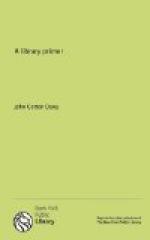e) The class of people by whom they are to be used, and if children, whether for school work only, or for general reading, or for both.
f) The occupations and leading local interests of the community.
g) The character and average degree of intelligence of the community.
h) The habits, as to reading and study, of those who will use the library.
The village library, in its early days, can well afford to begin at the level of the community’s average reading. At the same time it must always try to go a little ahead of the demands of the people, and develop a taste and desire for the very best books it can get. The masses of the people have very little of literary culture. It is the purpose of the public library to develop this by creating in them the habit of reading. As a rule people read books which are above their own intellectual and moral standard, and hence are benefited by reading. The reading of books generally leads to the reading of better books.
Then do not aim too high. Avoid trash, but do not buy literature which will not be read simply because it is standard or classic. Remember that the public library is a popular institution in every sense of the word; that it has become possible only by the approval of the majority of the population, and that the majority of the population is confined in its turn to a majority of people of the most commonplace kind.
Do not pander to any sect, creed, or partisan taste. Buy largely books costing from 50 cents to $2, found in so many of the series now published. These are fresh, up-to-date, written for the most part by competent men, and are reliable. They are not dull, because no one can afford to be dull in a 12mo volume. As a general thing they are well made, supplied with maps and illustrations when needed, and have indexes. Put much of your money into the history, travel, and literature of your own country first, and then see what you have left for Greece and Rome. The common people nowadays should be encouraged in their interest in their own country, its description, history, politics, biography, mineral resources, literature. The people will inquire for these books, and they should be provided for them. Wait until the library is larger before investing much money in the history of worn out empires, simply because such and such a person wants them, or because some library anywhere from two to twenty times as large has them. Use common sense and much of it.
Put into the people’s hands books worthy of their respect, then insist that they be handled carefully and treated always with consideration. Expensive books; that is, books which are first-class in paper, ink, and binding, are generally better worth their cost than cheap ones.
In the first purchases buy largely for children. They are the library’s best pupils. They are more easily trained to enjoy good books than their elders. Through them the homes are best reached. They will, by their free use of the library, and by their approval of it, do much to add to its popularity. The best books for children will be enjoyed by all.




